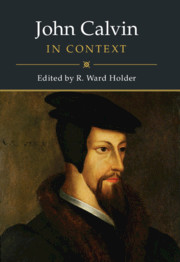Book contents
- John Calvin in Context
- John Calvin in Context
- Copyright page
- Dedication
- Contents
- Contributors
- Acknowledgments
- Abbreviations
- Introduction
- Part I France and Its Influence
- Part II Switzerland, Southern Germany, and Geneva
- Part III Empire and Society
- Part IV The Religious Question
- 19 Western Ideals of Religious Reform
- 20 The Luther Affair
- 21 Religious Colloquies
- 22 The Council of Trent and the Augsburg Interim
- 23 Biblical Scholarship
- 24 The Printed Word
- 25 Polemic’s Purpose
- 26 The Style of Theology
- 27 Baptism
- 28 The Eucharist
- 29 Predestination in Early Modern Thought
- 30 The Challenge of Heresy
- 31 Early Modern Christianity and Idolatry
- 32 Trinitarian Controversies
- 33 Nicodemism and Libertinism
- Part V Calvin’s Influences
- Part VI Calvin’s Reception
- Conclusion
- Bibliography
- Index
- References
22 - The Council of Trent and the Augsburg Interim
from Part IV - The Religious Question
Published online by Cambridge University Press: 14 November 2019
- John Calvin in Context
- John Calvin in Context
- Copyright page
- Dedication
- Contents
- Contributors
- Acknowledgments
- Abbreviations
- Introduction
- Part I France and Its Influence
- Part II Switzerland, Southern Germany, and Geneva
- Part III Empire and Society
- Part IV The Religious Question
- 19 Western Ideals of Religious Reform
- 20 The Luther Affair
- 21 Religious Colloquies
- 22 The Council of Trent and the Augsburg Interim
- 23 Biblical Scholarship
- 24 The Printed Word
- 25 Polemic’s Purpose
- 26 The Style of Theology
- 27 Baptism
- 28 The Eucharist
- 29 Predestination in Early Modern Thought
- 30 The Challenge of Heresy
- 31 Early Modern Christianity and Idolatry
- 32 Trinitarian Controversies
- 33 Nicodemism and Libertinism
- Part V Calvin’s Influences
- Part VI Calvin’s Reception
- Conclusion
- Bibliography
- Index
- References
Summary
The Augsburg Interim (“Declaration of His Roman Imperial Majesty on the Observance of Religion within the Holy Empire Until the Decision of the General Council”) was adopted at the 1548 Diet of Augsburg, marking the victory of Emperor Charles V (r. 1516–1556) in the Schmalkaldic War (1546–1547) by attempting to impose a religious reconciliation between followers of Martin Luther and the Catholic Church. Charles, also king of Spain, was beset by problems throughout his European possessions, stemming largely from the Reformation. The Interim was one effort to control these problems. The purpose of the document was to create a temporary compromise, to promote religious and political stability while waiting for a more definitive statement from the Council of Trent (which was in session at the time). The provisional nature did nothing to lessen Protestant fears of attempting to suppress dissent or to dampen concerns on the part of some Catholics that heresy was going unpunished; instead, it hardened divisions. Its failures contributed to a breakdown in Habsburg authority in central Europe.
Keywords
Information
- Type
- Chapter
- Information
- John Calvin in Context , pp. 190 - 197Publisher: Cambridge University PressPrint publication year: 2019
